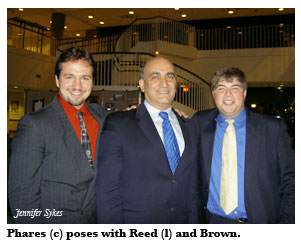Phares explores Al Qaeda and Middle Eastern affairs
 Almost every night, major news channels discuss the "conflict in the Middle East." What comes to mind when one hears that, however? According to Walid Phares, there is no one answer.
Almost every night, major news channels discuss the "conflict in the Middle East." What comes to mind when one hears that, however? According to Walid Phares, there is no one answer.
Almost every night, major news channels discuss the "conflict in the Middle East." What comes to mind when one hears that, however? According to Walid Phares, there is no one answer.
In a talk in late November that was supposed to be about Iran and Al Qaeda, Phares made a crucial point that no events are fully separate from any others in the age of globalization. He said there is "never a day without a major event" and listed almost 10 different situations in the region that have been in the news lately, from the never-ending Palestinian-Israel conflict to the Pope's recent visit to Turkey to the expansion of the genocide in Sudan and, of course, to the war in Iraq.
"It's what we refer to as a tabbouleh salad, or with a lot of little pieces," said Phares.
Phares, a Middle East scholar whose research interests include jihadist movements and strategies worldwide, set out to describe the history of Al Qaeda and Iran as a means of explaining the present situation. Phares claimed that limited understanding of the histories of the political groups caused the most problems for those making policies related to the Middle East, as well as too much of a focus on the conflict in Israel.
The critical difference between Al Qaeda and the Iranian regime involves the too often overlooked overall goal. Phares said Al Qaeda is seeking the return of the caliphate, while Iran wants to create an "Islamic republic."
Because Phares is one of the leading scholars on jihadism, his speech focused more on Al Qaeda than on Iran. Phares discussed the ramifications of the Salaf movement, a puritanical movement within Islam, in the early 20th century and how Al Qaeda had deviated from the original movements into a neo-Wahhabi or neo-Muslim brotherhood. Phares also informed the students that jihadists are, contrary to popular belief, rational actors.
"These are not just emotional people who jump every time there is a call. They are very rational," said Phares. Though ideology rationalizes the use of tactics, the choice of target is very strategic. When Russia invaded Afghanistan in the 1980s, a number of the jihadists left Israel because of an analysis of which country, Israel or Russia, was more threatening to their movement. Phares also said the same debate about targets was ongoing for current jihadists. After 9/11, a number of them said Al Qaeda still should have focused on smaller targets and worked against Israel; others justified the actions against America because of this country's perceived lack of morality.
At the end of his speech, Phares gave his opinion on the likelihood of democracy taking hold in the Middle East. While a number of regimes are in the process of changing over to democracies, Phares predicted that they would be unsuccessful. "I do not expect peace and milk and honey tomorrow in the Middle East," said Phares.
Phares was born in Lebanon and currently is a senior fellow at the Foundation for the Defense of Democracies. He is a terrorism expert for MSNBC but also appears on other major American networks and Al Jazeera. Phares also consults for different governments around the world on security issues. He holds degrees in law, political science and sociology, as well as in international relations and strategic studies from several universities around the world.
Students Defending Democracy, an organization connected to the Foundation for the Defense of Democracies, sponsored Phares' talk. Seniors Scott Brown and Michael Reed, this year's student counterterrorism fellows, organized the event as part of their fellowship. They also helped with a breakfast the next morning for students interested in the counterterrorism fellowship for the upcoming academic year.














